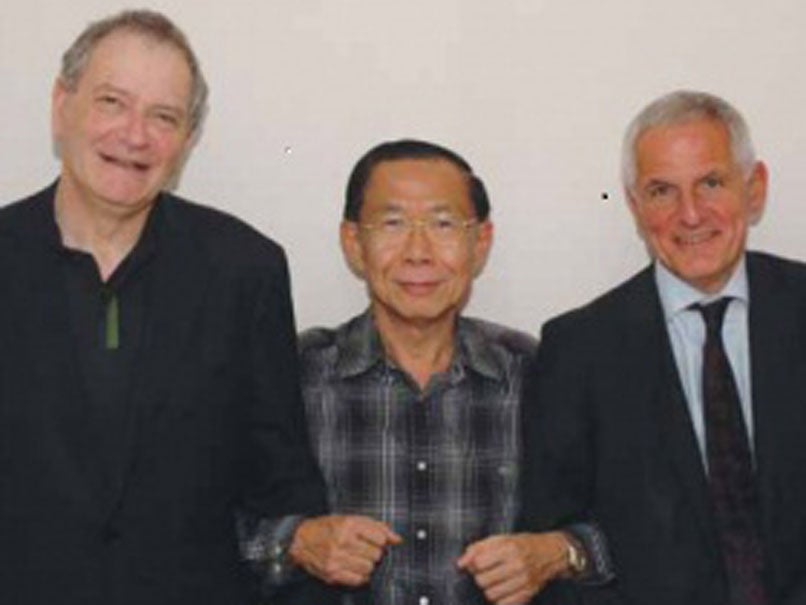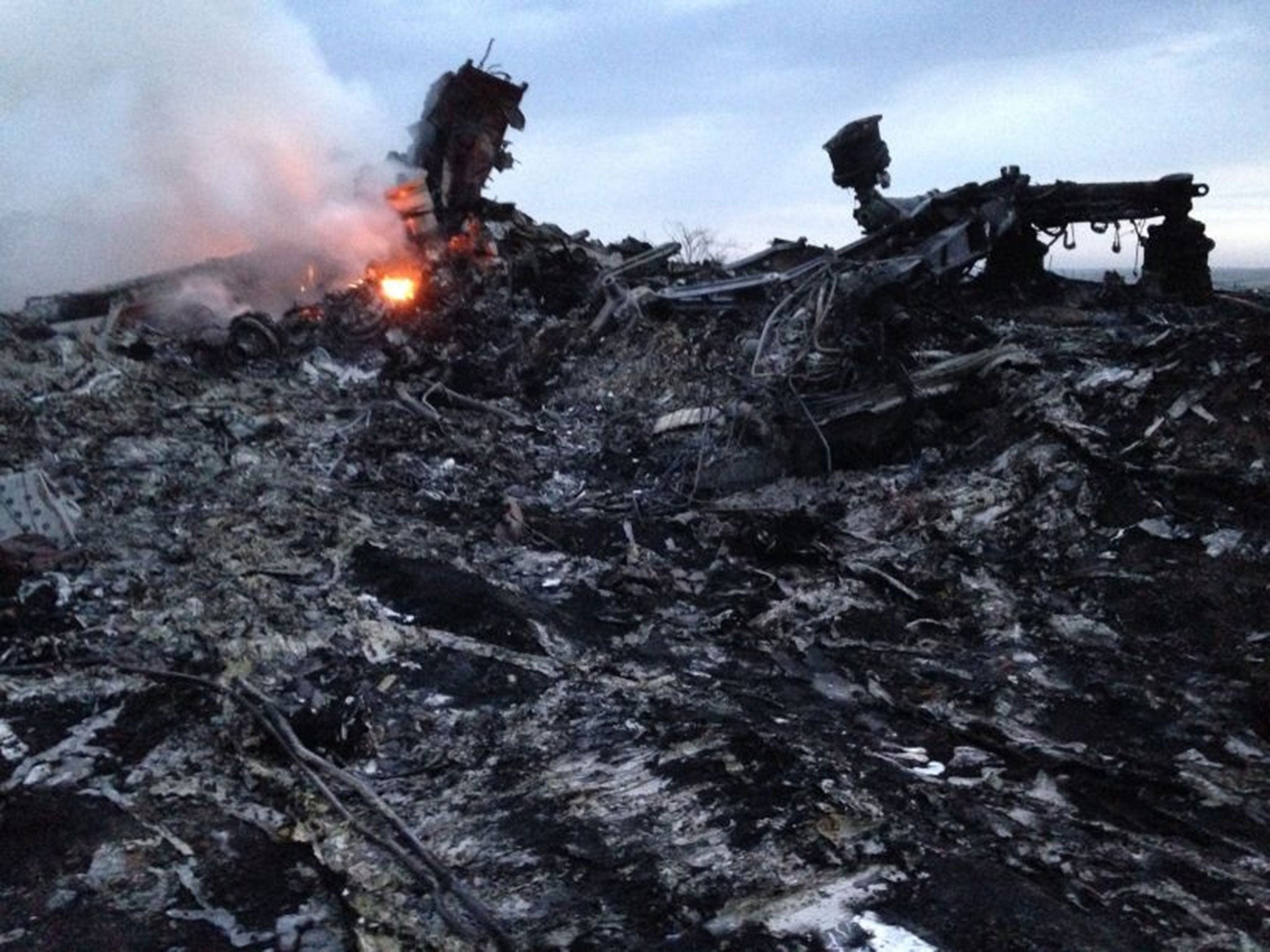Malaysia Airlines flight MH17 crash: Was the cure for Aids lost along with Joep Lange and 100 top researchers?
Joep Lange (far right) was with group on the way to an Aids conference

There are fears the cure for Aids could have been lost with 100 of the “best and brightest” scientists and researchers on board Malaysia Airlines flight MH17.
Joep Lange, a world-renowned researcher and former president of the International Aids Society, was with the group heading to the global Aids 2014 conference in Melbourne, Australia.
The exact number of scientists he was travelling with has not been confirmed but delegates in Sydney were told that emails indicted around 100 attendees were on the ill-fated plane.
Nine British passengers, including a student, former BBC journalist and two Newcastle United fans, were among the 298 people killed when the Boeing 777-200 was reportedly shot down as it passed over the war-torn country on Thursday.
Trevor Stratton, a Canadian HIV researcher attending the conference told ABC researchers had been getting close to a vaccine against Aids.
“What if the cure for AIDS was on that plane? Really? We don’t know,” he said.
“There were some really prominent researchers that have been doing this for a very long time and we’re getting close to vaccines and people are talking about cures and the end of AIDS.
“And you can’t help but wonder what kind of expertise was on that plane.”
Professor Richard Boyd, director of the Monash Immunology and Stem Cell Laboratories, told Guardian Australia there were “some serious HIV leaders” on board.
“This will have ramifications globally because whenever you lose a leader in any field, it has an impact. That knowledge is irreplaceable,” he said.
“We’ve lost global leaders and also some bright young people who were coming through. It’s a gut-wrenching loss. I was involved in the aftermath of 9/11 in New York and it brings back that level of catastrophe.”
Clive Aspin, a HIV researcher in Australia ahead of the Aids conference said there was a “huge feeling of sadness” among delegates, with people crying in corridors.
He added: “These people were the best and the brightest, the ones who had dedicated their whole careers to fighting this terrible virus.”
News of Mr Lange's death sent ripples through the Aids community, who paid tribute to a “giant” in the field who made invaluable advances in affordable treatment for sufferers in Asia and Africa.
Scientists at the Kirby Institute at the University of New South Wales (UNSW) in Australia said Mr Lange was travelling with his wife, Jacqueline.
Director of the institute, Professor David Cooper, said his friend had an “absolute commitment” to HIV treatment and care in Asia and Africa.
He added: “The joy in collaborating with Joep was that he would always bring a fresh view, a unique take on things, and he never accepted that something was impossible to achieve. Our joint work in Bangkok, the HIVNAT centre, will stand as his legacy.”
Professors Cooper had worked with Mr Lange on HIV treatment for decades and concentrated on “resource-poor” areas from the mid-1990s, attempting to prevent the disease taking hold in Asia the way it had in Africa.
In 1996 they established a research centre in Bangkok called HIV-NAT with a Thai colleague.
According to UNSW, Mr Lange had worked in Aids research and treatment since 1983 and made “ground-breaking” contributions to the development of affordable treatments.
He also played a pioneering role in exploring affordable and simple antiretroviral drug regimens for the prevention of mother-to-child transmission.
At the time of his death, Professor Lange was Professor of Medicine at the Academic Medical Center, University of Amsterdam and Senior Scientific Advisor to the International Antiviral Therapy Evaluation Centre, Amsterdam.
He was co-director of the HIV Netherlands Australia Research Collaboration (HIV-NAT) and a former president of International AIDS Society.
The group expressed its “sincere sadness” at news of the deaths of colleagues and friends on MH17, confirming they were on route to attend the 20th International AIDS Conference starting in Melbourne on Sunday.
“At this incredibly sad and sensitive time the IAS stands with our international family and sends condolences to the loved ones of those who have been lost to this tragedy,” a statement said.
“The IAS has also heard reports that among the passengers was a former IAS President Joep Lange and if that is the case then the HIV/AIDS movement has truly lost a giant.”
In 2001, he founded and chaired the PharmAccess Foundation, a not-for-profit organisation based in Amsterdam, designed to improve access to therapy in developing countries and was a founding editor of the academic journal, Antiviral Therapy.
Glenn Thomas, a British media relations co-ordinator for the World Health Organisation, was also part of the delegation, according to WHO officials.
The 49-year-old was a former BBC journalist from Blackpool and had recently celebrated his birthday, according to The Times.
Nine Britons, 154 Dutch, 27 Australians, 38 Malaysians, 23 US citizens and 80 children were among those on board Boeing 777-200 from Amsterdam to Kuala Lumpur.

None of the 298 and crew survived the crash, near the town of Grabovo in eastern Ukraine, which has seen fierce fighting between separatist militias and government troops.
Both pro-Russian rebels and the Ukrainian government denied shooting the aircraft down after US authorities said intelligence analysis showed it had been hit by a surface-to-air missile.
Join our commenting forum
Join thought-provoking conversations, follow other Independent readers and see their replies
Comments